Timeline of Lagos
The following is a timeline of the history of the metropolis of Lagos, Nigeria.
- This is an incomplete list that may never be able to satisfy particular standards for completeness. You can help by expanding it with reliably sourced entries.
Prior to 19th century
Part of a series on the |
||||||||||||||||||
|---|---|---|---|---|---|---|---|---|---|---|---|---|---|---|---|---|---|---|
| History of Nigeria | ||||||||||||||||||
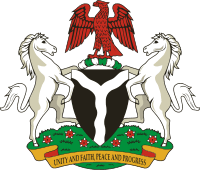 | ||||||||||||||||||
| Timeline | ||||||||||||||||||
|
||||||||||||||||||
| See also | ||||||||||||||||||
| Nigeria portal | ||||||||||||||||||
- 1472 - Ruy de Sequeira of Portugal names area "Lago de Curamo."
- 1600 - Ashipa becomes Oba.
- 1630
- King Ado in power.
- Iga Idunganran built (approximate date).
- 1669 - King Gabaro in power.
- 1704 - King Akinsemoyin in power.
- 1749
- Eletu Kekere becomes Oba.
- King Ologun Kutere in power.
- 1775 - Adele Ajosun becomes Oba.
- 1780 - Eshilokun becomes Oba.
19th century
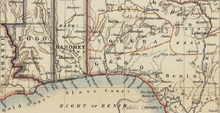
Detail of 1898 map showing Lagos, Nigeria
- 1819 - Oba Idowu Ojulari in power.
- 1836 - King Oluwole in power.
- 1841 - Akintoye becomes Oba.[1]
- 1845 - Oba Kosoko in power.[1]
- 1851 - British capture Lagos.[2][3]
- 1852 - British consulate established.[3]
- 1853 - King Dosunmu in power.
- 1860 - Catholic church established.[4]
- 1861 - Lagos annexed by the British.[2][5]
- 1862 - Lagos becomes a British colony.
- 1866 - Population: 25,083.
- 1881 - Population: 37,452.
- 1885 - Oba Oyekan in power.
- 1889 - Court House built.
- 1894 - Lagos Echo and Lagos Standard newspapers begin publication.[6]
- 1897 - Lagos Chamber of Commerce established.[7]
- 1899
- Anglo-African Bank established.[7]
- Briton William MacGregor becomes governor of Lagos Colony.
20th century
1900s-1950s

Colonial era Lagos, ca.1910
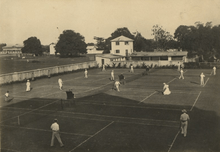
Colonialists on the tennis courts Government House in Lagos., ca.1910
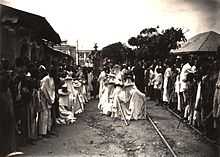
Lagos, 1912
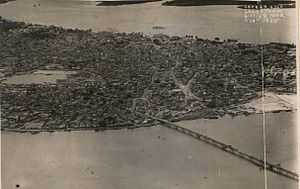
Aerial photograph of Lagos in 1929
- 1900 - Ibadan-Lagos railway begins operating.[8]
- 1901
- Oba Esugbayi Eleko in power.
- Carter Bridge built.
- Lagos Institute founded.[9]
- Population: 41,487.
- 1908 - Lagos Municipal Board of Health[10] and People's Union[11] established.
- 1909 - King's College, Lagos founded.[1]
- 1911
- 1913 - Apapa wharf built.[12]
- 1914
- Lagos becomes the capital of the British Southern Nigeria Protectorate.
- Lagos Central Times newspaper begins publication (approximate date).
- Anfani Bus Service begins operating.[13]
- 1917 - Lagos Town Council[5] and Colonial Bank[7] established.
- 1920s - Lagos Market Women's Association founded.[14]
- 1921 - Population: 98,303.
- 1923
- Ansar Ud Deen (religious group) formed.
- Nigerian National Democratic Party founded in Lagos.[11]
- 1925
- Oba Ibikunle Akitoye in power.
- Lagos Daily News newspaper begins publication.[15]
- 1926 - Nigerian Daily Times newspaper begins publication.[15]
- 1927 - Queen's College, Lagos and Lagos Executive Development Board[10] established.
- 1928
- Oba Sanusi Olusi in power.
- St Gregory's College, Lagos and Lagos Book Club founded.[16][17]
- 1930 - Stadium built.
- 1931
- Tom Jones Library opens.[17]
- Population: 126,474.
- 1932
- Oba Falolu in power.
- Igbobi College and Yaba Higher College founded.
- 1936 - Lagos Women's League organized.[1]
- 1939 - Yaba Estate built.
- 1943 - Art Exhibition Centre and Lagos Museum open.[1]
- 1944 - Nigerian Women's Party organized in Lagos.[14][18]
- 1945 - Holy Child College Obalende established.
- 1946
- Anglican Cathedral built.[19]
- Nigerian Breweries incorporated.
- 1947 - Yaba College of Technology founded.
- 1949
- "Rent control committee" organized.[7]
- Oba Adeniji Adele in power.
- 1950
- Mayoral council established; Abubakar Ibiyinka Olorun-Nimbe elected mayor.[10]
- Roman Catholic Archdiocese of Lagos active.[20]
- Population: 230,256.
- 1951 - Lagos becomes part of the Western Region.
- 1957
- Nigerian National Museum founded.
- Irohin Imole Yoruba-language newspaper begins publication.[21]
- 1958 - Stationery Stores Football Club founded.
1960s-1990s
- 1960 - Lagos Stock Exchange and Nigeria Acceptances Limited.
- 1961 - Nigerian Institute of International Affairs founded.[22]
- 1962 - University of Lagos established.[5]
- 1963
- Independence House built.[23]
- Population: 655,246.
- 1964
- Bagatelle restaurant in business (approximate date).[23]
- Lebanese Community School established.
- 1965 - Adeyinka Oyekan II becomes Oba.
- 1967
- Lagos State created.[24]
- Mobolaji Johnson becomes governor of Lagos State.[25]
- 1972 - Lagos National Stadium built.
- 1973 - 2nd All-Africa Games held.
- 1975
- Eko Bridge built.
- Federal Government College Lagos and Bridge Boys Football Club founded.
- Adekunle Lawal becomes governor of Lagos State.[25]
- 1976 - National Arts Theatre built.
- 1977
- Second World African Festival of Arts and Culture held in Festac Town.[1]
- Fela Kuti's Kalakuta Republic compound in Mushin burns down.
- Nigerian Institute of Medical Research established in Yaba (approximate date).[26]
- Ndubuisi Kanu becomes governor of Lagos State.[25]
- 1978 - Ebitu Ukiwe becomes governor of Lagos State.[25]
- 1979
- Murtala Muhammed International Airport opens.
- Lateef Jakande becomes governor of Lagos State.[25]
- 1980
- Lagos Plan of Action drafted.[24]
- Apata Memorial High School founded.
- Wonder Baking Company in business.[13]
- 1981
- International School Lagos established.
- Winners' Chapel megachurch begins.
- 1982 - Indian Language School established.
- 1983
- Vanguard newspaper begins publication.
- Mama Cass restaurant in business.[27]
- 1984 - Gbolahan Mudasiru becomes governor of Lagos State.[25]
- 1985 - Newswatch magazine begins publication.
- 1986 - Mike Akhigbe becomes governor of Lagos State.[25]
- 1988 - Raji Rasaki becomes governor of Lagos State.[25]
- 1989
- African Championships in Athletics held.
- Intercontinental Bank founded.
- 1990
- Third Mainland Bridge opens.
- Lagos City Polytechnic and Equitorial Trust Bank established.
- Population: 4,764,000 (urban agglomeration).[28]
- 1991
- Federal government relocates from Lagos to Abuja.[5]
- Tell Magazine begins publication.
- Diamond Bank opens.
- Lagos Business School established.
- 1992
- Pepsi Football Academy founded, Agege.[29]
- Nigerian Air Force C-130 crash.
- Michael Otedola becomes governor of Lagos State.[25]
- 1993
- Jhalobia Gardens opens.[30]
- Olagunsoye Oyinlola becomes governor of Lagos State.[25]
- 1994
- 1995
- 1996
- Babington Macaulay Junior Seminary established.
- Tastee Fried Chicken opens in Surulere.
- Mohammed Buba Marwa becomes governor of Lagos State.[25]
- 1997
- Redeemer's International Secondary School founded in Maryland.
- Tantalizers restaurant opens in Festac Town (approximate date).
- 1999
- 20 February: Nigerian parliamentary election, 1999 held.
- Bola Tinubu becomes governor of Lagos State.[25]
21st century
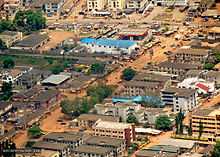
Lagos, 2008
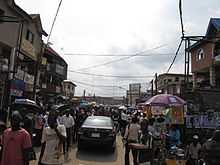
Lagos, 2010
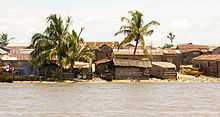
Lagos, 2011
- 2000 - Population: 7,233,000 (urban agglomeration).[28]
- 2001 - The Daily Independent newspaper begins publication.
- 2002
- City divided "into 57 local council areas."[24]
- Pan-African University, Lagos established.
- Lagos armoury explosion.
- 2003
- Oba Rilwan Akinlolu in power.
- The Sun newspaper begins publication.
- 2004
- Spring Bank founded.
- Silverbird Cinema in business.[32]
- 2005
- Business Day newspaper begins publication.
- SunRise Sixth Form College established.
- Population: 8,767,000 (urban agglomeration).[28]
- 16 November: Fire at Ebute Metta.[33]
- 2006
- The Nation newspaper begins publication.
- Tin Can Island Port Complex formed.[34]
- FinBank founded.
- Palms Shopping Mall opens.
- May - Atlas Creek pipeline explosion.
- December - Abule Egba pipeline explosion.
- Moments with Mo talk show begins broadcasting.[35]
- 2007
- April: State election held; Babatunde Fashola becomes governor of Lagos State.[36]
- Teslim Balogun Stadium built.
- Centre for Contemporary Art founded.[37]
- 2008
- Next newspaper begins publication.
- My People Football Club founded.
- Ijegun pipeline explosion.
- 2009 - Nike Centre for Art and Culture opens.[35]
- 2010 - Lagos Photo festival begins.
- 2011
- Lagos Fashion Week begins.[38]
- Ikeja City Mall,[39] L'Espace (shop), and Google office[40] in business.
- Enterprise Bank Limited, Keystone Bank Limited, and Mainstreet Bank Limited formed.
- 2012
- Makoko slum razed.[41]
- Lagos Countdown begins.
- 2013
- Lekki-Ikoyi Link Bridge opens.
- Eko Atlantic development construction begins.
- 2014 - Ebola virus outbreak.
See also
- History of Lagos
- List of Governors of Lagos State
- List of Lagos State local government areas by population
References
- ↑ 1.0 1.1 1.2 1.3 1.4 1.5 Toyin Falola; Ann Genova (2009). Historical Dictionary of Nigeria. Scarecrow Press. ISBN 978-0-8108-6316-3.
- ↑ 2.0 2.1 Thomas Spencer Baynes, ed. (1890), "Lagos", Encyclopedia Britannica (9th ed.), NY: Allen
- ↑ 3.0 3.1 Robert Sydney Smith (1979). The Lagos Consulate, 1851-1861. University of California Press. ISBN 978-0-520-03746-5.
- ↑ "Historical Hints: Dotted Events in Nigerian History". Catholic Diocese of Oyo. Retrieved 17 June 2012.
- ↑ 5.0 5.1 5.2 5.3 Toyin Falola; Ann Genova (2009). "Chronology". Historical Dictionary of Nigeria. Scarecrow Press. ISBN 978-0-8108-6316-3.
- ↑ Fred I.A. Omu (2005). "The Newspaper Press in Southern Nigeria, 1880-1900". In Boniface I. Obichere. Studies in Southern Nigerian History. Routledge. pp. 101–124. ISBN 978-1-135-78108-8.
- ↑ 7.0 7.1 7.2 7.3 Ayodeji Olukoju (2004). The 'Liverpool' of West Africa: The Dynamics and Impact of Maritime Trade in Lagos, 1900-1950. Africa World Press. ISBN 978-1-59221-292-7.
- ↑ Toyin Falola; Matthew M. Heaton (2008). A History of Nigeria. Cambridge University Press. ISBN 978-1-139-47203-6.
- ↑ Philip Serge Zachernuk (2000). "'Sphinx Must Solve Her Own Riddle': New Imperialism and New Imperatives, 1880s-1920". Colonial Subjects: An African Intelligentsia and Atlantic Ideas. University of Virginia Press. ISBN 978-0-8139-1908-9.
- ↑ 10.0 10.1 10.2 Hakeem Tijani (2004). "'New' Lagos Town Council and Urban Administration, 1950-1953". In Toyin Falola et al. Nigerian Cities. Africa World Press. ISBN 978-1-59221-169-2.
- ↑ 11.0 11.1 11.2 Richard L. Sklar (1963). "Origins of the Two-Party System in Lagos". Nigerian Political Parties: Power in an Emergent African Nation. Africa World Press. ISBN 978-1-59221-209-5.
- ↑ Ayodeji Olukoju (2014). "Port of Lagos, 1850-1929". In Miguel Bosa Suirez. Atlantic Ports and the First Globalisation C. 1850-1930. Palgrave Macmillan. pp. 112–129. ISBN 978-1-137-32798-7.
- ↑ 13.0 13.1 Tom G. Forrest (1994). "Lagos Enterprises". The Advance of African Capital: The Growth of Nigerian Private Enterprise. University of Virginia Press. pp. 86–130. ISBN 978-0-8139-1562-3.
- ↑ 14.0 14.1 Kathleen Sheldon (2005). "Chronology". Historical Dictionary of Women in Sub-Saharan Africa. Scarecrow Press. ISBN 978-0-8108-6547-1.
- ↑ 15.0 15.1 Toyin Falola (2001). Culture and Customs of Nigeria. Greenwood Publishing Group. ISBN 978-0-313-31338-7.
- ↑ Glenn L. Sitzman (1988), "Nigeria", African Libraries, Metuchen, N.J: Scarecrow Press, ISBN 0810820935
- ↑ 17.0 17.1 Anthony Olden (1995), "The Lagos Library", Libraries in Africa, Lanham, Maryland: Scarecrow Press, ISBN 0810830930
- ↑ Mojúbàolú Olúfúnké Okome (2013). Contesting the Nigerian State: Civil Society and the Contradictions of Self-Organization. Palgrave Macmillan. ISBN 978-1-137-32453-5.
- ↑ "Cathedral's History". Cathedral Church of Christ, Lagos. Retrieved 17 June 2012.
- ↑ "Chronology of Catholic Dioceses: Nigeria". www.katolsk.no. Norway: Oslo katolske bispedømme (Oslo Catholic Diocese). Retrieved September 2014.
- ↑ "Nigeria: Directory". Africa South of the Sahara 2004. Regional Surveys of the World. Europa Publications. 2004. ISBN 1857431839.
- ↑ "Organizations". International Relations and Security Network. Switzerland: Eidgenössische Technische Hochschule Zürich. Retrieved September 2014.
- ↑ 23.0 23.1 "Nigeria: Lagos", West Africa (4th ed.), Lonely Planet, 1999, pp. 710+, OL 8314753M
- ↑ 24.0 24.1 24.2 State of the World's Cities 2004/2005: Globalization and Urban Culture. UN-HABITAT. 2004. ISBN 978-92-1-131705-3.
- ↑ 25.0 25.1 25.2 25.3 25.4 25.5 25.6 25.7 25.8 25.9 25.10 25.11 "Past Governors". Lagos State Government. Retrieved September 2014.
- ↑ "Brief History". National Institute for Medical Research, Yaba, Lagos, Nigeria. Retrieved 17 June 2012.
- ↑ "Competition forces Mama Cass to shrink", Daily Independent (Lagos), February 2014
- ↑ 28.0 28.1 28.2 28.3 "The State of African Cities 2010: Governance, Inequalities and Urban Land Markets". United Nations Human Settlements Programme. 2010.
- ↑ "History". Pepsi Football Academy. Retrieved 17 June 2012.
- ↑ "History of Jhalobia Gardens". Retrieved 17 June 2012.
- ↑ "About Us". Lagos: Chocolat Royal. Retrieved September 2014.
- ↑ "Movie Theaters in Lagos, Nigeria". CinemaTreasures.org. Los Angeles: Cinema Treasures LLC. Retrieved September 2014.
- ↑ Ayodeji Olukoju (2012). "Anatomy of Fire Outbreaks in Lagos, Nigeria, 1980-2008". In Greg Bankoff et al. Flammable Cities: Urban Conflagration and the Making of the Modern World. USA: University of Wisconsin Press. pp. 353–371. ISBN 978-0-299-28383-4.
- ↑ Nigerian Ports Authority. "Tin Can Island Port Complex". Retrieved 17 June 2012.
- ↑ 35.0 35.1 "In Lagos, the 1% Takes Stock", New York Times, 25 April 2014
- ↑ Heinrich Bergstresser (2008). "Nigeria". In Andreas Mehler et al. Africa Yearbook: Politics, Economy and Society South of the Sahara in 2007 4. Koninklijke Brill. pp. 151–166. ISBN 9789004168053.
- ↑ "Nigeria". Art Spaces Directory. New York: New Museum. Retrieved 2 December 2013.
- ↑ "About". Arise. Arise Media UK. Retrieved 2 November 2013.
- ↑ Lolade Adewuyi (ed.). "Lagos City Photo Blog". Retrieved September 2014 – via Blogspot.
- ↑ "Corporate Information: Google Offices". Google Inc. Archived from the original on 29 May 2011.
- ↑ "Nigeria: Fury as Lagos State Government Demolishes #Makoko Slum". Global Voices. 17 July 2012.
Further reading
- Published in the 20th century
- Nigeria. Chief Secretary's Office (1919), The Nigeria handbook containing statistical and general information respecting the colony and protectorate, Lagos: Government Printer, OCLC 44555135
- Evelyn Irons (1961), "Lagos", Nigeria, Garden City, N.Y: N. Doubleday, OL 5817574M (children's book)
- Historical events: Lagos and environs, 1862-1962. Lagos: Federal Census Office. 1962. OCLC 48631290.
- Peter Marris (1962). Family and social change in an African city: a study of rehousing in Lagos. USA: Northwestern University Press – via Hathi Trust.
- Reuben K. Udo (1970). "Lagos Metropolitan District". Geographical Regions of Nigeria. University of California Press.
- Published in the 21st century
- Ayodeji Olukoju (2000). "Cost of Living in Lagos 1914-45". In David Anderson et al. Africa's Urban Past. Oxford: James Currey Publishers. ISBN 978-0-85255-761-7.
- Rem Koolhaas et al. (2000). "Lagos". Mutations. Barcelona: ACTAR. ISBN 9788495273536.
- Kristin Mann (2007). Slavery and the Birth of an African City: Lagos, 1760-1900. Indiana University Press. ISBN 0-253-11708-9.
- O.E. Aluko (2010), "Impact of Urbanization on Housing Development: The Lagos Experience, Nigeria", Ethiopian Journal of Environmental Studies and Management 3.3
- Michaela Alejandra Oberhofer (2012), "Fashioning African Cities: The Case of Johannesburg, Lagos and Douala", Streetnotes (20), ISSN 2159-2926 – via California Digital Library
- Peter Probst (2012). "Lagos-Oshodi". In Kerstin Pinther et al. Afropolis: City Media Art. Jacana Media. ISBN 978-1-4314-0325-7.
- Highlights of Lagos history : 1839-2012. Lagos State Records and Archives Bureau. 2012. OCLC 841475312.
- Bonny Ibhawoh (2013). "Imperial Cosmopolitanism and the Making of an Idigenous Intelligentsia: African Lawyers in Colonial Urban Lagos". In Elizabeth Fay and Leonard von Morze. Urban Identity and the Atlantic World. Palgrave Macmillan. ISBN 978-1-137-20555-1.
- Kye Whiteman (2013). Lagos: A Cultural History. Interlink Publishing. ISBN 978-1-62371-040-8.
- Seth D. Kaplan (7 January 2014), "What Makes Lagos a Model City", New York Times
External links
| Wikimedia Commons has media related to Lagos, Nigeria. |
- Map of Lagos, 1962
- Map of Lagos, 1984
- "(Articles related to Lagos)". Connecting-Africa. Leiden, Netherlands: African Studies Centre.
- "(Items related to Lagos)". Internet Library Sub-Saharan Africa. Germany: Frankfurt University Library.
Coordinates: 6°27′11″N 3°23′45″E / 6.45306°N 3.39583°E
| ||||||||||||||||||||||||||||||||||||||||||||||||||||||||||||||||||||||||||||||||||||
| ||||||||||||||||||||||||||||||
| ||||||